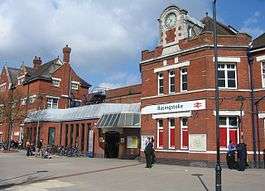Basingstoke railway station
| Basingstoke | |
|---|---|
|
The station frontage at Basingstoke | |
| Location | |
| Place | Basingstoke |
| Local authority | Borough of Basingstoke and Deane |
| Coordinates | 51°16′06″N 1°05′16″W / 51.2683°N 1.0878°WCoordinates: 51°16′06″N 1°05′16″W / 51.2683°N 1.0878°W |
| Grid reference | SU637525 |
| Operations | |
| Station code | BSK |
| Managed by | South West Trains |
| Number of platforms | 5 |
| DfT category | B |
|
Live arrivals/departures, station information and onward connections from National Rail Enquiries | |
| Annual rail passenger usage* | |
| 2010/11 |
|
| – Interchange |
|
| 2011/12 |
|
| – Interchange |
|
| 2012/13 |
|
| – Interchange |
|
| 2013/14 |
|
| – Interchange |
|
| 2014/15 |
|
| – Interchange |
|
| History | |
| Original company | London and South Western Railway |
| Pre-grouping | London and South Western Railway |
| Post-grouping | Southern Railway |
| 10 June 1839 | Station opened |
| National Rail – UK railway stations | |
| * Annual estimated passenger usage based on sales of tickets in stated financial year(s) which end or originate at Basingstoke from Office of Rail and Road statistics. Methodology may vary year on year. | |
|
| |
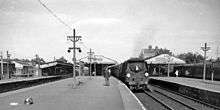
| Railways around Basingstoke | |||||||||||||||||||||||||||||||||||||||||||||||||||||||||||||||||||||||||||||||||||||||||||||||||||||||||||||||||||||||
|---|---|---|---|---|---|---|---|---|---|---|---|---|---|---|---|---|---|---|---|---|---|---|---|---|---|---|---|---|---|---|---|---|---|---|---|---|---|---|---|---|---|---|---|---|---|---|---|---|---|---|---|---|---|---|---|---|---|---|---|---|---|---|---|---|---|---|---|---|---|---|---|---|---|---|---|---|---|---|---|---|---|---|---|---|---|---|---|---|---|---|---|---|---|---|---|---|---|---|---|---|---|---|---|---|---|---|---|---|---|---|---|---|---|---|---|---|---|---|---|
Legend | |||||||||||||||||||||||||||||||||||||||||||||||||||||||||||||||||||||||||||||||||||||||||||||||||||||||||||||||||||||||
| |||||||||||||||||||||||||||||||||||||||||||||||||||||||||||||||||||||||||||||||||||||||||||||||||||||||||||||||||||||||
| Basingstoke & | ||||||||||||||||||||||||||||||||||||||||||||||||||||||||||||||||||||||||||||||||||||||||||||||||||||||||||||||||||
|---|---|---|---|---|---|---|---|---|---|---|---|---|---|---|---|---|---|---|---|---|---|---|---|---|---|---|---|---|---|---|---|---|---|---|---|---|---|---|---|---|---|---|---|---|---|---|---|---|---|---|---|---|---|---|---|---|---|---|---|---|---|---|---|---|---|---|---|---|---|---|---|---|---|---|---|---|---|---|---|---|---|---|---|---|---|---|---|---|---|---|---|---|---|---|---|---|---|---|---|---|---|---|---|---|---|---|---|---|---|---|---|---|---|---|
Legend | ||||||||||||||||||||||||||||||||||||||||||||||||||||||||||||||||||||||||||||||||||||||||||||||||||||||||||||||||||
| ||||||||||||||||||||||||||||||||||||||||||||||||||||||||||||||||||||||||||||||||||||||||||||||||||||||||||||||||||
Basingstoke railway station, in the town of Basingstoke in the county of Hampshire in England, is on the South Western Main Line from London Waterloo, with local and fast services operated by South West Trains. It is the terminus of Great Western Railway local services on the Reading to Basingstoke Line. Long distance cross-country services operated by CrossCountry to Bournemouth from Birmingham, Manchester and further north, join the main line from the branch there. The station is sponsored by AXA Winterthur Insurance, which is based in the town.
History
The station was opened by the London and South Western Railway as a temporary terminus when its line to Southampton reached Basingstoke from London. It became a through station when the section running north from Southampton was completed later in 1840. The intention to build a line from near Basingstoke to Bristol was dropped when the Great Western Railway was approved.[1] The L&SWR did, however plan a line to Salisbury from Basingstoke but this was delayed by financial difficulties. Eventually, it was built reaching Andover in 1854 and Salisbury three years later, before being extended to become the West of England Main Line.
The Great Western Railway opened its broad gauge line from Reading on 1 November 1848 with a separate station north of the L&SWR station.[2] After its conversion to mixed gauge on 22 December 1856 through services could run between Southampton and Reading. The broad gauge rail was removed on 1 April 1869.[3] The GWR station was closed on 1 January 1932[4] demolished in 1932, since which trains from Reading have used the main station.[5]
Basingstoke station was the terminus of the Basingstoke and Alton Light Railway, opened in 1901 to prevent the GWR from building a line on this route towards Portsmouth. The line was never profitable. During the First World War some of the track was sold off. After the war, Southern Railway had the line reopened, but it was closed finally in 1932.
In the 1980s Platform 5 was converted to a bay platform to permit an entrance on the northern side by British Rail. In 1993, an explosive device planted by the Provisional Irish Republican Army was found in a toilet, soon after a bomb scare at Reading railway station.[6] In 2001 a suitcase was left outside the station containing the mutilated body of a man in his twenties. He had been stabbed to death.[7]
Anglia Railways ran a London Crosslink service from Ipswich to Basingstoke via Stratford and the North London Line using Class 170 'Turbostars' between May 2000 and September 2002. South West Trains also ran a local service from Reading to Brighton until timetable changes on 9 December 2007.[8] Southern railway services from Southampton and Portsmouth to Brighton were improved to compensate for that.[9]
Platforms
The station has five platforms, all of which can be used bi-directionally. They are above street level and are accessed via stairs and lifts from the booking hall and subway.[10]
Platform 1
Platform 1 is the closest to the main entrance on the south side. It is used by terminating slow services to and from London Waterloo.[11] Regional services to Southampton and Poole also stop here, along with westbound CrossCountry services to Southampton and Bournemouth.
Platforms 2 & 3
Platform 2 is on the south side of the island platform with Platform 3 on the north. Platform 2 is used by the other down main line services to Portsmouth and Southampton from Waterloo. It is also used by trains on the West of England Main Line to Salisbury, where every other train continues to Exeter. Some peak-time trains divide at Salisbury with one portion running to Bristol Temple Meads. Up trains use Platform 3 and are the fastest trains to London Waterloo.
Platform 4
Some slower trains to London Waterloo use Platform 4, on the northern side of station. It is also used by northbound CrossCountry which head to Reading before reversing and continuing to Birmingham, and onwards to the north. Northbound freight trains from Southampton docks heading this way also pass through here. The rear entrance to the station is located on this platform.
Platform 5
Platform 5 is a bay platform used by stopping services to Reading on the Reading to Basingstoke Line operated by Great Western Railway.
Facilities
The station has two entrances. The main entrance to the south has access to a taxi rank, some car parks and a bus stop, with steps down to The Malls shopping centre. A bridge over Churchill Way leads to the bus station. Festival Place can be accessed from The Malls or the bus station, while Festival Square and the Top of Town are located beyond the bus station. The northern entrance on Platform 4 gives access to a car park.
The south booking hall has ticket facilities (including ticket machines), information and a small shop. The station is staffed all day, and both entrances have ticket barriers.
There is a small café on the central island platform and another on Platform 4, as well as indoor waiting rooms.
Signalling
The station area and its various routes have been controlled by colour light signalling since the mid-1960s. The 1966 panel box (which controlled the main line from west of Woking through to Micheldever and Andover along with part of the line to Reading) was located on the north side of the line to the east of the station, but this was superseded by a new facility in 2007 when the area was resignalled. It was announced in 2013 that a new Network Rail signalling operating centre would be built in Basingstoke; the contract was for £30 million. Twelve such regional control centres were to be built in the following 15 to 30 years, which will be responsible for all the signalling in the Wessex & South West England area (right through from London Waterloo to Weymouth, Portsmouth Harbour and Exeter).[12] Several routes have had their signal control moved to Basingstoke, including the West of England main line Salisbury to Exmouth Jn in 2012 [13] and the Poole - Wareham - Wool section of the line to Weymouth in 2015.
Incidents
On 19 December 2008 an over-height container on a freight train struck and damaged 140 yards (130 m) of the canopy of platform 1.[14] The train was stopped before it reached the tunnels north of Micheldever.
Motive Power Depots
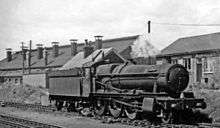
The London and South Western Railway opened a locomotive shed on the south side of the main line, to the west of the station in 1839. This was closed in 1909 to make way for station enlargement. It was replaced by a larger structure on the north side of the line. This was closed by British Railways in March 1963, but remained in use as a servicing point until the end of steam in July 1967. It was demolished in 1969.[15]
The Berks and Hants Railway opened a small shed to the east of the station on the north side of the line in 1850. This was closed by British Railways in November 1950, and demolished to make way for sidings.[16]
Services
Typical off peak service patterns:
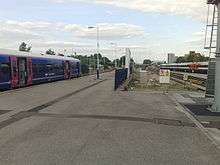
South West Trains
South Western Main Line - Eastbound[17]
- 7tph London Waterloo, of which:
- 1tph only calls at Clapham Junction
- 1tph only calls at Woking
- 1tph calls at Woking and Clapham Junction
- 1tph calls at Farnborough (Main) and Woking
- 1tph calls at Fleet, Farnborough (Main) and Clapham Junction
- 2tph stopping which start here, calling at all stations to Woking then Weybridge, Walton-on-Thames and Surbiton, then:
- 1tph calls at Clapham Junction, and the other doesn't.
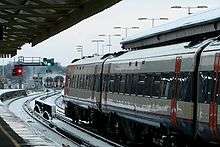
South Western Main Line - Westbound
- 3tph Winchester, of which:
- 1tph Portsmouth Harbour
- 2tph Southampton Central, of which:
- 2tph Salisbury, of which:
- 1tph to Exeter St Davids
- 3tpd to Bristol Temple Meads
- 5tpd to Yeovil Pen Mill
- 1tpd to Weymouth (Summer Saturdays)
- 5tpd to Yeovil Pen Mill
- 3tpd to Bristol Temple Meads
- 1tph to Exeter St Davids
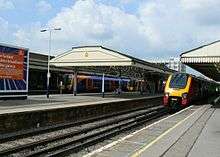
- 1tph Birmingham New Street and then to Manchester Piccadilly via Stoke-on-Trent
- 1tph Bournemouth
- 1tp2h to Newcastle via Birmingham & Doncaster
- 2tph Reading (all local stations)
| Preceding station | |
Following station | ||
|---|---|---|---|---|
| Hook | South West Trains Waterloo to Basingstoke |
Terminus | ||
| Fleet or Farnborough or Woking or Clapham Junction | South West Trains South Western Main Line Fast/Semi-Fast Services |
Winchester | ||
| South West Trains South Western Main Line Stopping Services |
Micheldever | |||
| Woking | South West Trains West of England Main Line |
Overton or Andover | ||
| Reading | CrossCountry Bournemouth-Manchester |
Winchester | ||
| CrossCountry Southampton-Newcastle |
||||
| CrossCountry Bournemouth-Edinburgh |
||||
| Bramley (Hants) | Great Western Railway Reading to Basingstoke Line |
Terminus | ||
| Historical railways | ||||
| Farnborough (Main) | Anglia Railways London Crosslink |
Terminus | ||
| Disused railways | ||||
| Terminus | Basingstoke and Alton Light Railway | Cliddesden | ||
| Terminus | Park Prewett Hospital Railway | Park Prewett Hospital | ||
References
- ↑ Christopher J. Tolley (2004). "BRH: On the Main Line". Archived from the original on 19 April 2008. Retrieved 22 May 2008.
- ↑ MacDermot, E T (1927). History of the Great Western Railway. 1 (1833-1863) (1 ed.). London: Great Western Railway.
- ↑ MacDermot, E T (1931). History of the Great Western Railway. 2 (1863-1921) (1 ed.). London: Great Western Railway.
- ↑ Passengers No More by G.Daniels and L.Dench
- ↑ "Great Western Railway publicity". The Great Western Archive. 2006. Archived from the original on 5 July 2008. Retrieved 22 May 2008.
- ↑ "History A Time Line of Policing the Railways". BTP History Society. 2003. Archived from the original on 25 January 2008. Retrieved 13 March 2008.
- ↑ "'Body in suitcase' monk guilty". BBC News – www.bbc.co.uk. 8 April 2003. Archived from the original on 29 June 2006. Retrieved 21 October 2007.
- ↑ "New timetable: Service changes from 9 Dec 2007". South West Trains. 2007. Archived from the original on 18 January 2008. Retrieved 21 January 2008.
- ↑ "West CoastWay – How it affects you". Southern Railway. 2007. Retrieved 21 January 2008.
- ↑ Station Plan - BasingstokeNational Rail Enquiries; Retrieved 15 August 2016
- ↑ "Basingstoke station platforms 1 & 2" Horn, Graham, Geograph.org; Retrieved 15 August 2016
- ↑ BAM to build Network Rail signalling centre Global Rail News article 2 October 2013; Retrieved 13 February 2014
- ↑ http://www.yeovilrailway.freeservers.com/120312.html
- ↑ "Rail Accident Investigation Board – Incident involving a container train at Basingstoke station, 19 December 2008" (PDF). August 2009. Archived (PDF) from the original on 7 October 2009. Retrieved 25 August 2009.
- ↑ Griffiths, Roger; Smith, Paul (1999). The directory of British engine Sheds and Principal Locomotive Servicing Points: 1. Oxford: Oxford Publishing Co. p. 48. ISBN 0-86093-542-6.
- ↑ Griffiths, Roger; Smith, Paul (1999). The directory of British enging Sheds and Principal Locomotive Servicing Points: 1. Oxford: Oxford Publishing Co. p. 48. ISBN 0-86093-542-6.
- ↑ GB National Rail Timetable 2016, Tables 155 & 158
- ↑ GB National Rail Timetable 2016, Table 160
- ↑ GB National Rail Timetable 2016, Table 51
- ↑ GB National Rail Timetable 2016, Table 122
External links
| Wikimedia Commons has media related to Basingstoke railway station. |
